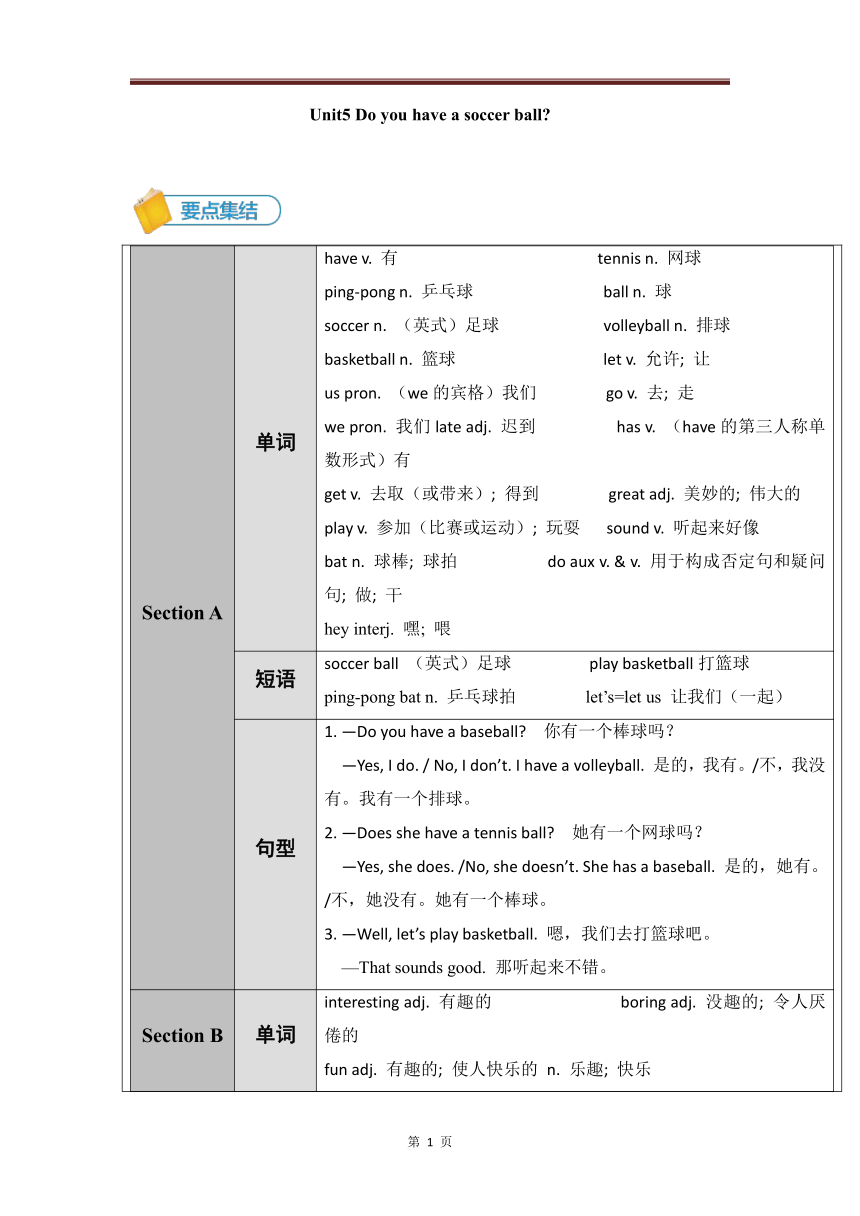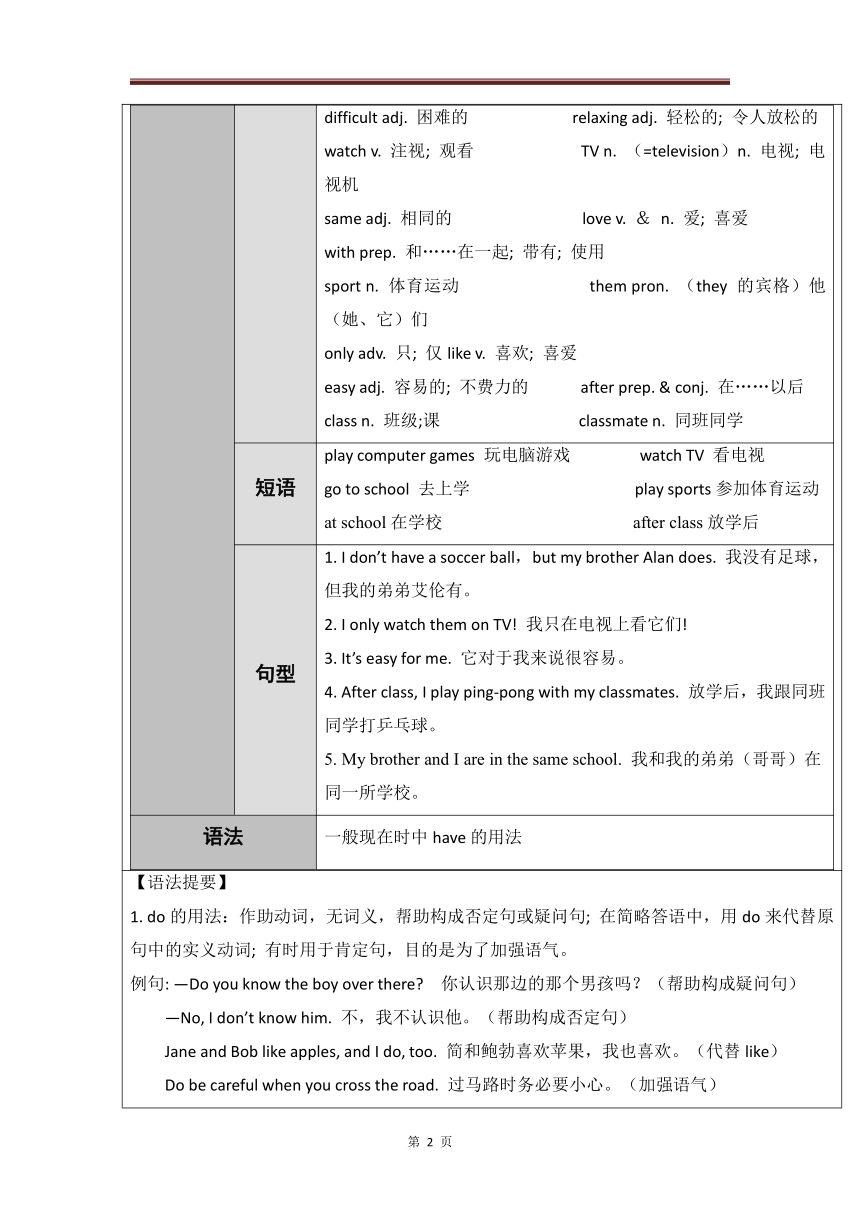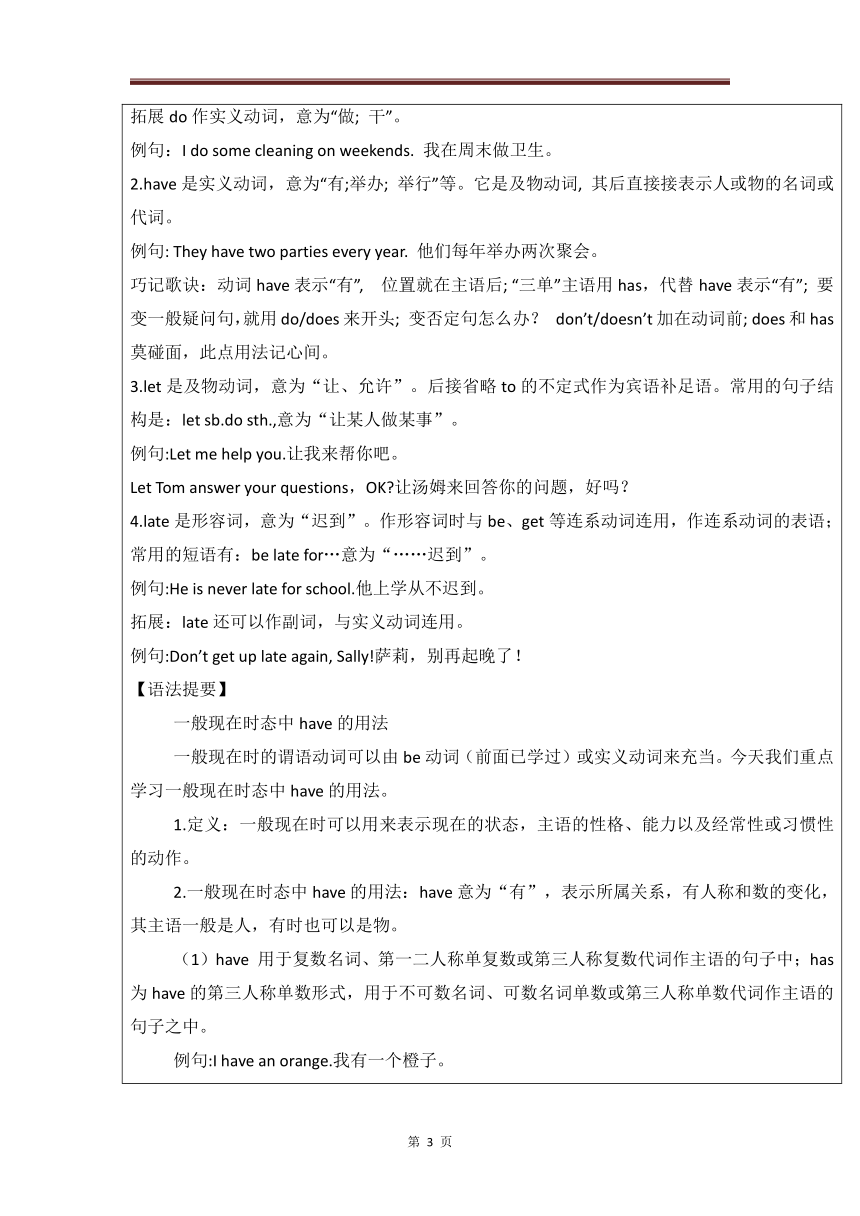Unit5 Do you have a soccer ball 知识点归纳
文档属性
| 名称 | Unit5 Do you have a soccer ball 知识点归纳 |  | |
| 格式 | docx | ||
| 文件大小 | 48.2KB | ||
| 资源类型 | 教案 | ||
| 版本资源 | 人教新目标(Go for it)版 | ||
| 科目 | 英语 | ||
| 更新时间 | 2021-09-07 21:47:54 | ||
图片预览



文档简介
Unit5
Do
you
have
a
soccer
ball?
Section
A单词have
v.
有
tennis
n.
网球
ping-pong
n.
乒乓球
ball
n.
球
soccer
n.
(英式)足球
volleyball
n.
排球
basketball
n.
篮球
let
v.
允许;
让
us
pron.
(we的宾格)我们
go
v.
去;
走
we
pron.
我们late
adj.
迟到
has
v.
(have的第三人称单数形式)有
get
v.
去取(或带来);
得到
great
adj.
美妙的;
伟大的
play
v.
参加(比赛或运动);
玩耍
sound
v.
听起来好像
bat
n.
球棒;
球拍
do
aux
v.
&
v.
用于构成否定句和疑问句;
做;
干
hey
interj.
嘿;
喂短语soccer
ball
(英式)足球
play
basketball打篮球
ping-pong
bat
n.
乒乓球拍
let’s=let
us
让我们(一起)句型1.
—Do
you
have
a
baseball?
你有一个棒球吗?
—Yes,
I
do.
/
No,
I
don’t.
I
have
a
volleyball.
是的,我有。/不,我没有。我有一个排球。
2.
—Does
she
have
a
tennis
ball?
她有一个网球吗?
—Yes,
she
does.
/No,
she
doesn’t.
She
has
a
baseball.
是的,她有。/不,她没有。她有一个棒球。
3.
—Well,
let’s
play
basketball.
嗯,我们去打篮球吧。
—That
sounds
good.
那听起来不错。Section
B单词interesting
adj.
有趣的
boring
adj.
没趣的;
令人厌倦的
fun
adj.
有趣的;
使人快乐的
n.
乐趣;
快乐
difficult
adj.
困难的
relaxing
adj.
轻松的;
令人放松的
watch
v.
注视;
观看
TV
n.
(=television)n.
电视;
电视机
same
adj.
相同的
love
v.
&
n.
爱;
喜爱
with
prep.
和……在一起;
带有;
使用
sport
n.
体育运动
them
pron.
(they
的宾格)他(她、它)们
only
adv.
只;
仅like
v.
喜欢;
喜爱
easy
adj.
容易的;
不费力的
after
prep.
&
conj.
在……以后
class
n.
班级;课
classmate
n.
同班同学短语play
computer
games
玩电脑游戏
watch
TV
看电视
go
to
school
去上学
play
sports参加体育运动
at
school在学校
after
class放学后句型1.
I
don’t
have
a
soccer
ball,but
my
brother
Alan
does.
我没有足球,但我的弟弟艾伦有。
2.
I
only
watch
them
on
TV!
我只在电视上看它们!
3.
It’s
easy
for
me.
它对于我来说很容易。
4.
After
class,
I
play
ping-pong
with
my
classmates.
放学后,我跟同班同学打乒乓球。
5.
My
brother
and
I
are
in
the
same
school.
我和我的弟弟(哥哥)在同一所学校。语法一般现在时中have的用法
【语法提要】
1.
do的用法:作助动词,无词义,帮助构成否定句或疑问句;
在简略答语中,用do来代替原句中的实义动词;
有时用于肯定句,目的是为了加强语气。
例句:
—Do
you
know
the
boy
over
there?
你认识那边的那个男孩吗?(帮助构成疑问句)
—No,
I
don’t
know
him.
不,我不认识他。(帮助构成否定句)
Jane
and
Bob
like
apples,
and
I
do,
too.
简和鲍勃喜欢苹果,我也喜欢。(代替like)
Do
be
careful
when
you
cross
the
road.
过马路时务必要小心。(加强语气)
拓展do作实义动词,意为“做;
干”。
例句:I
do
some
cleaning
on
weekends.
我在周末做卫生。
2.have是实义动词,意为“有;举办;
举行”等。它是及物动词,
其后直接接表示人或物的名词或代词。
例句:
They
have
two
parties
every
year.
他们每年举办两次聚会。
巧记歌诀:动词have表示“有”,
位置就在主语后;
“三单”主语用has,代替have表示“有”;
要变一般疑问句,就用do/does来开头;
变否定句怎么办?
don’t/doesn’t加在动词前;
does和has莫碰面,此点用法记心间。
3.let是及物动词,意为“让、允许”。后接省略to的不定式作为宾语补足语。常用的句子结构是:let
sb.do
sth.,意为“让某人做某事”。
例句:Let
me
help
you.让我来帮你吧。
Let
Tom
answer
your
questions,OK?让汤姆来回答你的问题,好吗?
4.late是形容词,意为“迟到”。作形容词时与be、get等连系动词连用,作连系动词的表语;常用的短语有:be
late
for…意为“……迟到”。
例句:He
is
never
late
for
school.他上学从不迟到。
拓展:late还可以作副词,与实义动词连用。
例句:Don’t
get
up
late
again,
Sally!萨莉,别再起晚了!
【语法提要】
一般现在时态中have的用法
一般现在时的谓语动词可以由be动词(前面已学过)或实义动词来充当。今天我们重点学习一般现在时态中have的用法。
1.定义:一般现在时可以用来表示现在的状态,主语的性格、能力以及经常性或习惯性的动作。
2.一般现在时态中have的用法:have意为“有”,表示所属关系,有人称和数的变化,其主语一般是人,有时也可以是物。
(1)have
用于复数名词、第一二人称单复数或第三人称复数代词作主语的句子中;has为have的第三人称单数形式,用于不可数名词、可数名词单数或第三人称单数代词作主语的句子之中。
例句:I
have
an
orange.我有一个橙子。
Tom
has
a
friend.汤姆有一个朋友。
(2)have/has作谓语时的句型转换。
①否定句式:主语+don't/
doesn't
+
have…
例句:I
don't
have
an
eraser.我没有橡皮擦。
He
doesn't
have
a
tennis
bat.他没有网球拍。
②一般疑问式:Do/Does+主语+have…?
肯定答语:Yes,主语+do/does.否定答语:No,主语+don't/doesn't.
例句:—Do
you
have
a
bike?你有自行车吗?
—Yes,
I
do./No,
I
don't.是的,我有。/不,我没有。
—Does
she
have
a
tennis
ball?她有网球吗?
—Yes,
she
does./No,
she
doesn't.是的,她有。/不,她没有。
【语法提要】
1.
interesting
interesting为形容词,意为“有趣的”,可以位于名词前作定语,也可以放在系动词后作表语。
例句:That
is
an
interesting
book.
那是一本有趣的书。
The
story
is
very
interesting.
这个故事很有趣。
辨析:interesting与interested
interesting意为“有趣的、令人感兴趣的”,指事物本身能引起人的兴趣。常在句中作定语或作表语。I
have
an
interesting
book
for
children.
我有一本有趣的儿童书。interested意为“对……感兴趣,对……表现出兴趣”,指某人对某事物感兴趣,常用人作主语。be/get/become
interested
in…意为“对……感兴趣”。Are
you
interested
in
English?
你对英语感兴趣吗?
2.
watch
(1)watch作动词,意为“观看,注视”,常用短语:watch
TV看电视。
(2)watch作名词,意为“手表”,是可数名词,其复数形式为watches。
辨析:watch与look
watch作动词时后面可直接跟宾语,表示长时间地观看某一活动的场面,强调“专注地看”,有欣赏的意味,常用于看电视,看球赛等;
而look后面不直接跟宾语,通常与介词at连用,也可单独使用,强调看的动作。
例句:—Would
you
like
to
play?
你想玩吗?
—No,
thanks.
I’ll
just
watch.
不,谢谢。我看看就好了。
【语法提要】
1.
same
same是形容词,意为“同样的;
相同的”,常与the连用。the
same可以作定语、表语等。
例句:
Chinese
people
and
American
people
don’t
have
the
same
food.
中国人与美国人吃不一样的食物。
My
notebook
and
your
notebook
are
the
same.
我的笔记本跟你的笔记本是一样的。
Lucy
and
Lily
look
the
same.
露西和莉莉长得像。
2.
with
with是介词,此处意为“与……一起”。其后可接名词或代词。
例句:
I
would
like
to
stay
with
them.
我想跟他们待在一起。
3.
easy
easy是形容词,意为“简单的;
容易的”。其反义词为difficult
(难的)。easy可在名词前作定语或在连系动词后作表语。常见句型有“It’s
easy
for
sb.
+
(to
do
sth.
)”。
例句:
Do
you
think
these
are
all
easy
questions?
你认为这些都是简单的问题吗?
Most
boys
say
math
is
easy
and
interesting.
多数男生都说数学简单且有趣。
It’s
easy
for
him.
这对他来说很容易。
1.??soccer
ball足球2.??tennis
racket网球拍3.??ping-pong
ball
=
table
tennis乒乓球4.??ping-pong
bat乒乓球拍5.??play
basketball打篮球6.??play
ping-pong
=
play
table
tennis打乒乓球7.??play
volleyball打排球8.??play
soccer
=
play
football踢足球9.??play
baseball打棒球10.?play
tennis打网球11.?a
sports
club体育俱乐部12.?play
sports
=
do
sports做运动13.?watch
TV看电视14.?on
TV在电视上15.?watch
…
on
TV在电视上观看……16.?every
day每天17.
the
same
school相同的学校18.
with
me和我一起19.
with
my
friends和朋友一起20.
after
school放学后21.
after
class下课后22.
go
to
the
same
school上相同的学校23.
let’s
do让我们。。。二.重点句型1.—Do
you
have
a
ping-pong
ball?你有乒乓球吗?2.—Does
he
have
a
soccer
ball?他有足球吗3
.
Tom
has
a
soccer
ball.
Tom有足球。4.
Let’s
play
tennis.让我们
打网球吧。5.
That
sounds
good.那听起来真好。6.
I
watch
them
on
TV我通过电视看它们4.
He
has
two
ping-pong
bats.他有两个乒乓球拍5.
I
don't
have
a
soccer
ball。我没有足球7.
She
doesn’t
have
a
volleyball.她没有排球8.
We
go
to
the
same
school
and
we
love
soccer.我们去同一所学校上学,我们热爱足球。9..
We
play
soccer
at
school
with
our
friends.
It’s
relaxing.我们在学校里和朋友踢足球。这很放松。13.
I
don’t
have
a
soccer
b
all,
but
Alan
does.我没有足球,但艾伦有。14.
I
like
ping-pong.
It's
easy
for
me.我喜欢打兵兵球。这对我来说很容易。15.
Let
me
get
it.
让我去拿它吧。16.
I
love
sports,
but
I
don’t
play
them.我喜欢运动,但我不做运动。17.
After
class,
I
play
ping-pong
with
my
classmates。下课后我与同学一起打乒乓球
Do
you
have
a
soccer
ball?
Section
A单词have
v.
有
tennis
n.
网球
ping-pong
n.
乒乓球
ball
n.
球
soccer
n.
(英式)足球
volleyball
n.
排球
basketball
n.
篮球
let
v.
允许;
让
us
pron.
(we的宾格)我们
go
v.
去;
走
we
pron.
我们late
adj.
迟到
has
v.
(have的第三人称单数形式)有
get
v.
去取(或带来);
得到
great
adj.
美妙的;
伟大的
play
v.
参加(比赛或运动);
玩耍
sound
v.
听起来好像
bat
n.
球棒;
球拍
do
aux
v.
&
v.
用于构成否定句和疑问句;
做;
干
hey
interj.
嘿;
喂短语soccer
ball
(英式)足球
play
basketball打篮球
ping-pong
bat
n.
乒乓球拍
let’s=let
us
让我们(一起)句型1.
—Do
you
have
a
baseball?
你有一个棒球吗?
—Yes,
I
do.
/
No,
I
don’t.
I
have
a
volleyball.
是的,我有。/不,我没有。我有一个排球。
2.
—Does
she
have
a
tennis
ball?
她有一个网球吗?
—Yes,
she
does.
/No,
she
doesn’t.
She
has
a
baseball.
是的,她有。/不,她没有。她有一个棒球。
3.
—Well,
let’s
play
basketball.
嗯,我们去打篮球吧。
—That
sounds
good.
那听起来不错。Section
B单词interesting
adj.
有趣的
boring
adj.
没趣的;
令人厌倦的
fun
adj.
有趣的;
使人快乐的
n.
乐趣;
快乐
difficult
adj.
困难的
relaxing
adj.
轻松的;
令人放松的
watch
v.
注视;
观看
TV
n.
(=television)n.
电视;
电视机
same
adj.
相同的
love
v.
&
n.
爱;
喜爱
with
prep.
和……在一起;
带有;
使用
sport
n.
体育运动
them
pron.
(they
的宾格)他(她、它)们
only
adv.
只;
仅like
v.
喜欢;
喜爱
easy
adj.
容易的;
不费力的
after
prep.
&
conj.
在……以后
class
n.
班级;课
classmate
n.
同班同学短语play
computer
games
玩电脑游戏
watch
TV
看电视
go
to
school
去上学
play
sports参加体育运动
at
school在学校
after
class放学后句型1.
I
don’t
have
a
soccer
ball,but
my
brother
Alan
does.
我没有足球,但我的弟弟艾伦有。
2.
I
only
watch
them
on
TV!
我只在电视上看它们!
3.
It’s
easy
for
me.
它对于我来说很容易。
4.
After
class,
I
play
ping-pong
with
my
classmates.
放学后,我跟同班同学打乒乓球。
5.
My
brother
and
I
are
in
the
same
school.
我和我的弟弟(哥哥)在同一所学校。语法一般现在时中have的用法
【语法提要】
1.
do的用法:作助动词,无词义,帮助构成否定句或疑问句;
在简略答语中,用do来代替原句中的实义动词;
有时用于肯定句,目的是为了加强语气。
例句:
—Do
you
know
the
boy
over
there?
你认识那边的那个男孩吗?(帮助构成疑问句)
—No,
I
don’t
know
him.
不,我不认识他。(帮助构成否定句)
Jane
and
Bob
like
apples,
and
I
do,
too.
简和鲍勃喜欢苹果,我也喜欢。(代替like)
Do
be
careful
when
you
cross
the
road.
过马路时务必要小心。(加强语气)
拓展do作实义动词,意为“做;
干”。
例句:I
do
some
cleaning
on
weekends.
我在周末做卫生。
2.have是实义动词,意为“有;举办;
举行”等。它是及物动词,
其后直接接表示人或物的名词或代词。
例句:
They
have
two
parties
every
year.
他们每年举办两次聚会。
巧记歌诀:动词have表示“有”,
位置就在主语后;
“三单”主语用has,代替have表示“有”;
要变一般疑问句,就用do/does来开头;
变否定句怎么办?
don’t/doesn’t加在动词前;
does和has莫碰面,此点用法记心间。
3.let是及物动词,意为“让、允许”。后接省略to的不定式作为宾语补足语。常用的句子结构是:let
sb.do
sth.,意为“让某人做某事”。
例句:Let
me
help
you.让我来帮你吧。
Let
Tom
answer
your
questions,OK?让汤姆来回答你的问题,好吗?
4.late是形容词,意为“迟到”。作形容词时与be、get等连系动词连用,作连系动词的表语;常用的短语有:be
late
for…意为“……迟到”。
例句:He
is
never
late
for
school.他上学从不迟到。
拓展:late还可以作副词,与实义动词连用。
例句:Don’t
get
up
late
again,
Sally!萨莉,别再起晚了!
【语法提要】
一般现在时态中have的用法
一般现在时的谓语动词可以由be动词(前面已学过)或实义动词来充当。今天我们重点学习一般现在时态中have的用法。
1.定义:一般现在时可以用来表示现在的状态,主语的性格、能力以及经常性或习惯性的动作。
2.一般现在时态中have的用法:have意为“有”,表示所属关系,有人称和数的变化,其主语一般是人,有时也可以是物。
(1)have
用于复数名词、第一二人称单复数或第三人称复数代词作主语的句子中;has为have的第三人称单数形式,用于不可数名词、可数名词单数或第三人称单数代词作主语的句子之中。
例句:I
have
an
orange.我有一个橙子。
Tom
has
a
friend.汤姆有一个朋友。
(2)have/has作谓语时的句型转换。
①否定句式:主语+don't/
doesn't
+
have…
例句:I
don't
have
an
eraser.我没有橡皮擦。
He
doesn't
have
a
tennis
bat.他没有网球拍。
②一般疑问式:Do/Does+主语+have…?
肯定答语:Yes,主语+do/does.否定答语:No,主语+don't/doesn't.
例句:—Do
you
have
a
bike?你有自行车吗?
—Yes,
I
do./No,
I
don't.是的,我有。/不,我没有。
—Does
she
have
a
tennis
ball?她有网球吗?
—Yes,
she
does./No,
she
doesn't.是的,她有。/不,她没有。
【语法提要】
1.
interesting
interesting为形容词,意为“有趣的”,可以位于名词前作定语,也可以放在系动词后作表语。
例句:That
is
an
interesting
book.
那是一本有趣的书。
The
story
is
very
interesting.
这个故事很有趣。
辨析:interesting与interested
interesting意为“有趣的、令人感兴趣的”,指事物本身能引起人的兴趣。常在句中作定语或作表语。I
have
an
interesting
book
for
children.
我有一本有趣的儿童书。interested意为“对……感兴趣,对……表现出兴趣”,指某人对某事物感兴趣,常用人作主语。be/get/become
interested
in…意为“对……感兴趣”。Are
you
interested
in
English?
你对英语感兴趣吗?
2.
watch
(1)watch作动词,意为“观看,注视”,常用短语:watch
TV看电视。
(2)watch作名词,意为“手表”,是可数名词,其复数形式为watches。
辨析:watch与look
watch作动词时后面可直接跟宾语,表示长时间地观看某一活动的场面,强调“专注地看”,有欣赏的意味,常用于看电视,看球赛等;
而look后面不直接跟宾语,通常与介词at连用,也可单独使用,强调看的动作。
例句:—Would
you
like
to
play?
你想玩吗?
—No,
thanks.
I’ll
just
watch.
不,谢谢。我看看就好了。
【语法提要】
1.
same
same是形容词,意为“同样的;
相同的”,常与the连用。the
same可以作定语、表语等。
例句:
Chinese
people
and
American
people
don’t
have
the
same
food.
中国人与美国人吃不一样的食物。
My
notebook
and
your
notebook
are
the
same.
我的笔记本跟你的笔记本是一样的。
Lucy
and
Lily
look
the
same.
露西和莉莉长得像。
2.
with
with是介词,此处意为“与……一起”。其后可接名词或代词。
例句:
I
would
like
to
stay
with
them.
我想跟他们待在一起。
3.
easy
easy是形容词,意为“简单的;
容易的”。其反义词为difficult
(难的)。easy可在名词前作定语或在连系动词后作表语。常见句型有“It’s
easy
for
sb.
+
(to
do
sth.
)”。
例句:
Do
you
think
these
are
all
easy
questions?
你认为这些都是简单的问题吗?
Most
boys
say
math
is
easy
and
interesting.
多数男生都说数学简单且有趣。
It’s
easy
for
him.
这对他来说很容易。
1.??soccer
ball足球2.??tennis
racket网球拍3.??ping-pong
ball
=
table
tennis乒乓球4.??ping-pong
bat乒乓球拍5.??play
basketball打篮球6.??play
ping-pong
=
play
table
tennis打乒乓球7.??play
volleyball打排球8.??play
soccer
=
play
football踢足球9.??play
baseball打棒球10.?play
tennis打网球11.?a
sports
club体育俱乐部12.?play
sports
=
do
sports做运动13.?watch
TV看电视14.?on
TV在电视上15.?watch
…
on
TV在电视上观看……16.?every
day每天17.
the
same
school相同的学校18.
with
me和我一起19.
with
my
friends和朋友一起20.
after
school放学后21.
after
class下课后22.
go
to
the
same
school上相同的学校23.
let’s
do让我们。。。二.重点句型1.—Do
you
have
a
ping-pong
ball?你有乒乓球吗?2.—Does
he
have
a
soccer
ball?他有足球吗3
.
Tom
has
a
soccer
ball.
Tom有足球。4.
Let’s
play
tennis.让我们
打网球吧。5.
That
sounds
good.那听起来真好。6.
I
watch
them
on
TV我通过电视看它们4.
He
has
two
ping-pong
bats.他有两个乒乓球拍5.
I
don't
have
a
soccer
ball。我没有足球7.
She
doesn’t
have
a
volleyball.她没有排球8.
We
go
to
the
same
school
and
we
love
soccer.我们去同一所学校上学,我们热爱足球。9..
We
play
soccer
at
school
with
our
friends.
It’s
relaxing.我们在学校里和朋友踢足球。这很放松。13.
I
don’t
have
a
soccer
b
all,
but
Alan
does.我没有足球,但艾伦有。14.
I
like
ping-pong.
It's
easy
for
me.我喜欢打兵兵球。这对我来说很容易。15.
Let
me
get
it.
让我去拿它吧。16.
I
love
sports,
but
I
don’t
play
them.我喜欢运动,但我不做运动。17.
After
class,
I
play
ping-pong
with
my
classmates。下课后我与同学一起打乒乓球
同课章节目录
- starters 预备篇(2012秋审查)
- Unit 1 Good morning !
- Unit 2 What’s this in English?
- Unit 3 What color is it ?
- Unit 1 My name's Gina.
- Section A
- Section B
- Unit 2 This is my sister.
- Section A
- Section B
- Unit 3 Is this your pencil?
- Section A
- Section B
- Unit 4 Where's my schoolbag?
- Section A
- Section B
- Unit 5 Do you have a soccer ball?
- Section A
- Section B
- Unit 6 Do you like bananas?
- Section A
- Section B
- Unit 7 How much are these socks?
- Section A
- Section B
- Unit 8 When is your birthday?
- Section A
- Section B
- Unit 9 My favorite subject is science.
- Section A
- Section B
